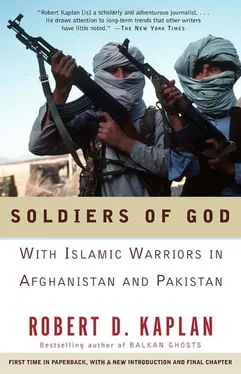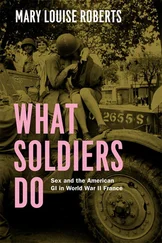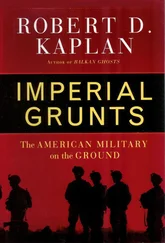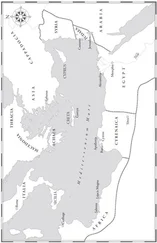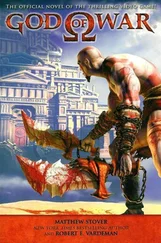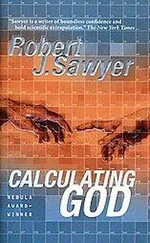My room was on the roof of a house that overlooked an expanse of rice fields, through which the same water buffalos plodded home every day at dusk, as in a silk screen or bas-relief. On my last evening in Peshawar, my eyes were drawn to a shimmer of fire-red in the distance: the gossamer chador (veil) of the young woman driving the herd along a mud embankment. To me, that lone flash of a primary color symbolized the rich and voluptuous civilization of the Indian subcontinent that ended, literally, beyond those fields, where the landscape lost its watery, terra cotta glow and was replaced by a mass of corrugated, pie-crust hills, whose scarred, cindery gradients warned of heat and cold and all other means of physical discomfort. That was where the war was, and to understand who the mujahidin really were, you had to go there.
On the bed I’d laid out the native costume I had just purchased for a total of 400 rupees ($25) from a Pathan merchant in the bazaar. It consisted of a pakol, a flat woolen hat from the Hindu Kush mountain region of Chitral, and the traditional shalwar kameez worn by the Pathans — a pair of baggy cotton pants held up by a string and a long, flowing shirt with a collar and deep side pocket. I tried the costume on, wearing no underwear as recommended, since among the guerrillas, the only opportunity to bathe would be in a stream with all my clothes on. Like Kim in Rudyard Kipling’s novel, I “felt mechanically for the moustache” and beard that were just beginning to sprout on my face. Kim, too, had put on a native costume given him by a Pathan to espy the Northwest Frontier. And if I thought of Kim as I looked at the pathetic imposter in the mirror, it was not, I hoped, the effect of a romantic inclination but simply because, as in so many other instances, Kipling’s writing offered the only sure guide to this war. (One of my colleagues, Jonathan Randal of the Washington Post, had told me, “Had the Russians read Kipling more carefully, they might never have invaded Afghanistan.”)
In the side pocket of the shalwar kameez I placed my notebook, camera, and water purification tablets. My rucksack was small, since I might have to carry it everywhere. There was room inside only for the afghanis, a second shalwar kameez, a sleeping bag, towel, comb, toothbrush and toothpaste, flashlight, film, pocketknife, short-wave radio, toilet paper, flea powder, mosquito repellent, painkillers, antibiotics, and malaria pills. The canteen I would carry separately.
Reporters permanently covering the Afghan war were tied to a wheel of psychological torture that never stopped turning. First there was the boredom and insecurity of waiting in Peshawar for the trip inside to materialize, something that didn’t always happen, and when it did it was often weeks later than the mujahidin had promised. Then there was the attack of fear and dread when you suddenly found out — usually the night before departure — where exactly you would be going and that it was too late to back out. Finally came the loneliness, physical torment, and pure wonder of the trip itself. I was now in the second phase of that cycle, surrounded by four walls and a glimpse of desolation from my room, about to travel alone with a group of mujahidin into Afghanistan and feeling more scared and lonely than I ever felt before.
The fact that I had a wife and son back in Greece only increased my sense of isolation. Among the journalists who regularly went inside, I knew of only one who had a family, and he had told me never to carry along pictures of loved ones in Afghanistan. “You should put your family out of your mind completely,” he said. “Just do what you have to do, survive, and get out.” Looking at the picture of my wife and son at the harbor on the Aegean island of Paros, I decided not to take his advice. I slid the color photograph into my pocket.
“May you never be tired, pathan!” said the horse dealer Mahbub Ali to Kim when the boy departed. I hoped this benediction might apply to me too.
Peshawar, the capital of Pakistan’s Northwest Frontier province, was always a city of colonial cliches where adventures, both real and imagined, began. Edward Behr, an Indian army veteran and for years a foreign correspondent for Time and Newsweek, once observed: “Though the British Raj was about to fall apart with terrifying suddenness, Peshawar…was still a bastion of tradition and Kiplingesque behavior.” The Afghan war made this even more true in the 1980s than in the 1940s, the period Behr was writing about.
Peshawar (literally, Frontier Town) lies on a teeming panel of reddish-black earth at the foot of the Khyber Pass, the fabled gateway between the Indian subcontinent and the gaunt mountains and plateaus of central Asia, over which the sun sets in a blaze of garish pigments every night. Layered with mud and fine dust and smelling of baked brick, diesel exhaust, sickly sweet incense, and dung, Peshawar is a typical Dickensian town of the industrialized Third World.
Only in the old cantonment, built and formerly occupied by the British, is the city’s soot-smudged tableau lightened somewhat by green lawns and stately red brick mansions, built in Anglo-Indian Gothic style. In the tidy parade grounds, if you use your imagination, Peshawar evokes a smoky nineteenth-century lithograph of British India. But everywhere outside the cantonment there is only noise, traffic, and a hot, dense bath of electrified air suffused with embers and metallic sparks. The warrened, cratered streets are cluttered with horse-drawn tongas, careening auto rickshaws, and gaudy Bedford trucks, which feature gruesome examples of popular art on their sideboards, such as a picture of an F-16 squadron zooming out of the lipstick-smeared mouth of an Asian diva. Despite such vulgar touches, the city still retains enough potted, old-fashioned romance to seduce a foreign correspondent in search of the exotic.
Peshawar has a bazaar, of course — where I had bought my costume and Afghan money — filled with all sorts of gongs, trinkets, and the best selection of reasonably priced oriental carpets in Asia. There’s an eccentric hotel too: a run-down, rambling hostelry dating from the time of the Raj, called Dean’s after a British colonial governor, staffed by zombielike waiters and known as a hangout for spies and other intriguers. And then there are the Pathans, who with their beards, turbans, bandoleers, and eyes darkened with kohl are like extras in a Hollywood movie. At the far end of town, just before the road begins its dramatic, winding ascent toward Afghanistan,is an official Khyber Gate that is inscribed with several verses from a Kipling poem, “Arithmetic on the Frontier”:
A scrimmage in a Border Station —
A canter down some dark defile —
Two thousand pounds of education
Drops to a ten-rupee jezail —
The Crammer’s boast, the Squadron’s pride,
Shot like a rabbit in a ride!
Was there ever such rich terrain for romantic self-delusion?
At the end of the 1970s, Peshawar went from being a quaint backwater to a geopolitical fault zone, and new, worse cliches were piled on the Kiplingesque ones. The Islamic revolution in Iran closed off an important route for international drug smugglers. No longer could opium, extracted from locally grown red poppies, be transported west from Pakistan. Instead, laboratories were set up in the barren, dun-brown hills that loom on either side of the Khyber Pass. In small, concealed mud brick redoubts the opium was refined into billions of dollars’ worth of heroin before being brought by truck and airplane to the port of Karachi and smuggled to Europe and America. A year after the Iranian revolution, the Soviet Union invaded Afghanistan and placed the Red Army at Peshawar’s doorstep. Refugees poured down the mountains into the plain surrounding the city. Mujahidin political parties set up their headquarters in the refugee camps. Peshawar’s population doubled, from 500,000 to a million. And journalists, relief workers, drug enforcement agents, aspiring mercenaries, both real and would-be spies, and a rabble of weirdos who defied categorization filled Dean’s and nearby Green’s Hotel, a gloom-ridden, poured-concrete sepulcher that was half the price of Dean’s.
Читать дальше
